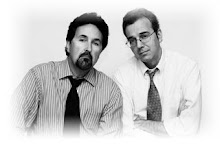Thursday, July 30, 2009
Media coverage on emerging discoveries improves
By Steve Hammons
Journalists and the news media seem to be taking a closer look at how they cover and report on unconventional scientific topics. Professional and objective news coverage seems to have improved in recent years when it comes to things like UFOs, human extrasensory perception (ESP), ideas about other dimensions and similar subjects.
In addition, movies, TV and other entertainment media also often explore these kinds of areas, sometimes with mixed results. Still, valuable perspectives often seem to be part of creative projects from Hollywood and elsewhere.
In many cases, journalists and scriptwriters do their homework and conduct fairly thorough research to get a feel for the state of knowledge and understanding about certain topics.
At the same time, some writers may not fully understand the background on some unconventional subjects and may, consciously or inadvertently, misrepresent the situation and put forth an inaccurate picture.
EMERGING VIEWS
Some researchers and observers who take a look at the UFO field have reported that the mainstream news media seems to have been covering that subject with greater objectivity and professionalism. This was especially notable in the 2008 cluster of incidents in the region around Stephenville, Texas.
After local residents contacted their small-town newspaper, a reporter there wrote objective and straightforward news stories. These were picked up and covered by the Associated Press and other national and international news media, also in a mostly responsible and professional way.
CNN’s Larry King has demonstrated professional objectivity and intelligent inquiry about the UFO topic in some of his shows.
Journalists and others in the media appear to be learning more about the scientific investigations into a number of unconventional areas. Sometimes, these investigations are discreet, low-key or even covert and secret.
What about discoveries in “weird physics” which seem to imply that our Universe and the nature of Nature may have interesting and unusual aspects that we may not fully understand? Physicists are finding some fascinating things in certain leading-edge research.
Another example of an unconventional area of study is that of ESP. It has been also called the sixth sense, intuition and anomalous cognition. Additional terms that might be useful are “alternative cognition” or “complementary cognition.” Thorough research, development and utilization of this kind of human perception and awareness have been conducted by the U.S. defense and intelligence communities.
A notable media portrayal that touched on some of this research is the 2004 book The Men Who Stare at Goats, by UK writer Jon Ronson. The book is being made into a movie starring George Clooney, Ewan McGregor, Kevin Spacey and Jeff Bridges. Filming has been completed and the movie is currently in post-production editing and development.
Some people familiar with the topics in Ronson’s book say that his representation is incomplete in certain areas. While making fun of, and alerting us to the dangers of certain U.S. military activities, Ronson might also have missed some very important and valuable elements of advanced research that can be helpful.
The movie version, using the same title as the book, is planned for release Feb. 18, 2010, by Smoke House Pictures, a company owned by Clooney and Grant Heslov, who is directing it. Will the movie team add more insight and deeper perspective? We’ll see.
MEDIA RESPONSIBILITY AND REWARD
Whether we are talking about mainstream news journalists, writers, various kinds of new media or people in the creative media fields of TV and film, it seems that there continue to be mixed results in the coverage, exploration and portrayals of certain emerging subjects. As a result, the public is not as fully informed as it could be.
Average Americans and people around the world might benefit from greater understanding about the possibilities involved in some leading-edge research.
Every student in a journalism class knows that a topic should be covered by explaining the “who, what, when, where, why, how.” When we get into more vague or complex subjects, such as those involving unconventional phenomena topics, there may be a greater challenge and responsibility for the news media, and also greater reward.
In the entertainment field, this same situation seems to hold true as well. Examining and presenting complicated subjects in a context that works for the book, TV show or movie is not always easy.
Most consumers of media platforms and products probably want a truthful and complete picture of a given topic or combination of topics, even in an entertainment context. Truth seems to have a resonance that draws people to it. So, if attracting an audience is a goal, then including truthful portrayals of situations is a win-win.
In addition, Americans and people internationally may be getting increasingly sophisticated about emerging unconventional topics. People may want more information that is accurate and thorough on these kinds of issues.
There is probably a ready-made audience of human beings across our planet that is waiting for the next news article, book, TV show or movie that will take us a step further along in dealing with fascinating unconventional topics.

























































































































































































